外研版必修5 Module 2 A Job Worth DoingGrammar & Function课件(41张PPT)
文档属性
| 名称 | 外研版必修5 Module 2 A Job Worth DoingGrammar & Function课件(41张PPT) |

|
|
| 格式 | zip | ||
| 文件大小 | 2.5MB | ||
| 资源类型 | 教案 | ||
| 版本资源 | 外研版 | ||
| 科目 | 英语 | ||
| 更新时间 | 2022-02-11 20:49:30 | ||
图片预览


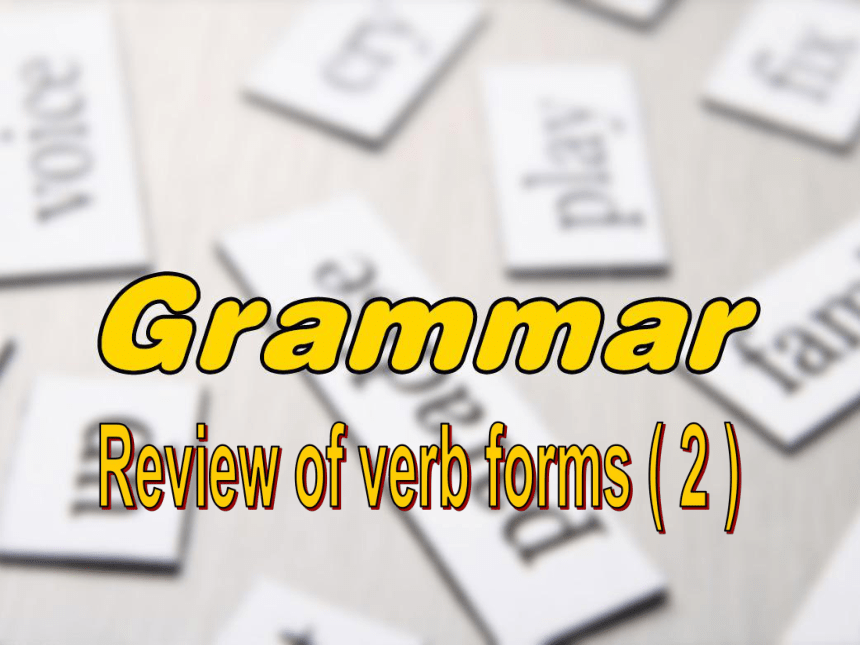
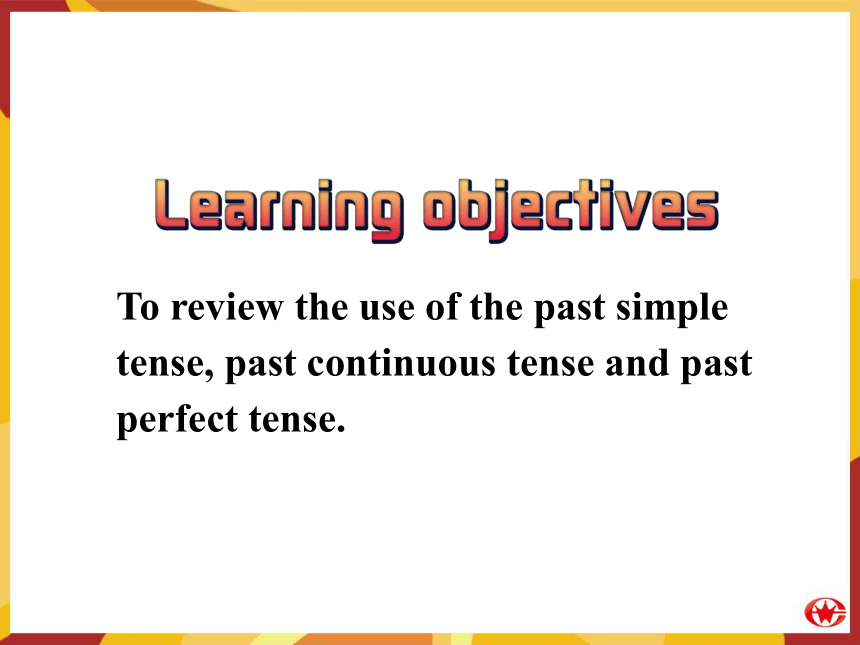
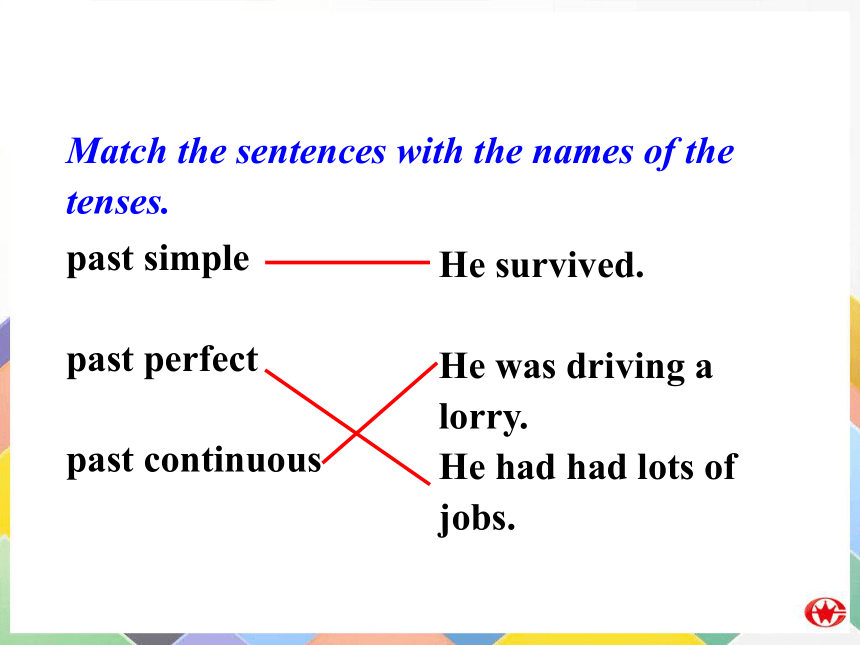
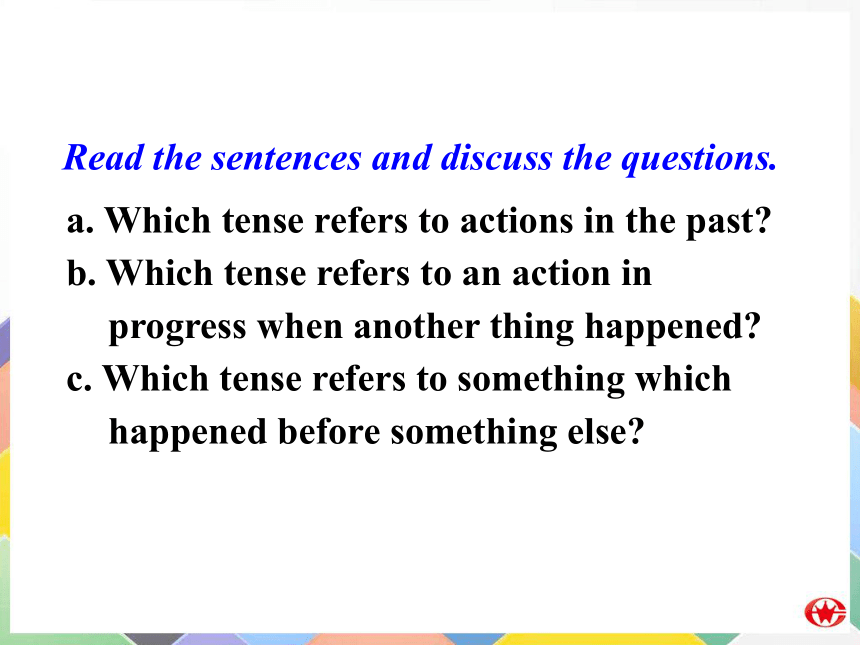
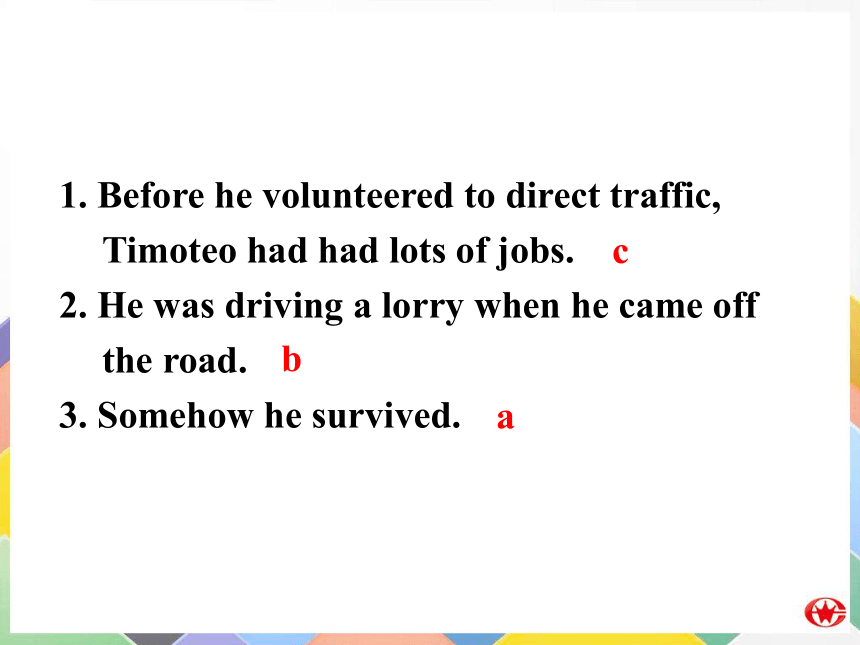
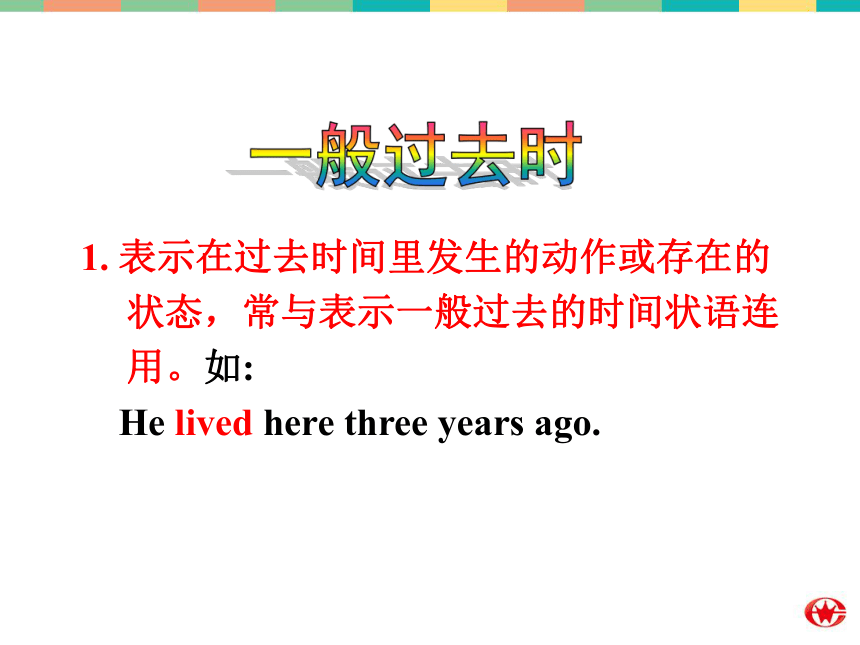
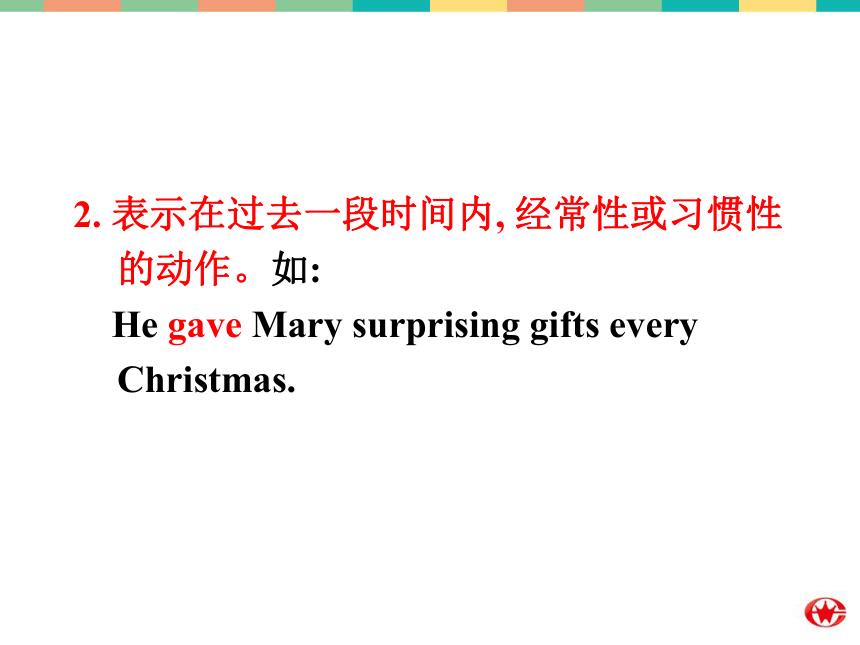
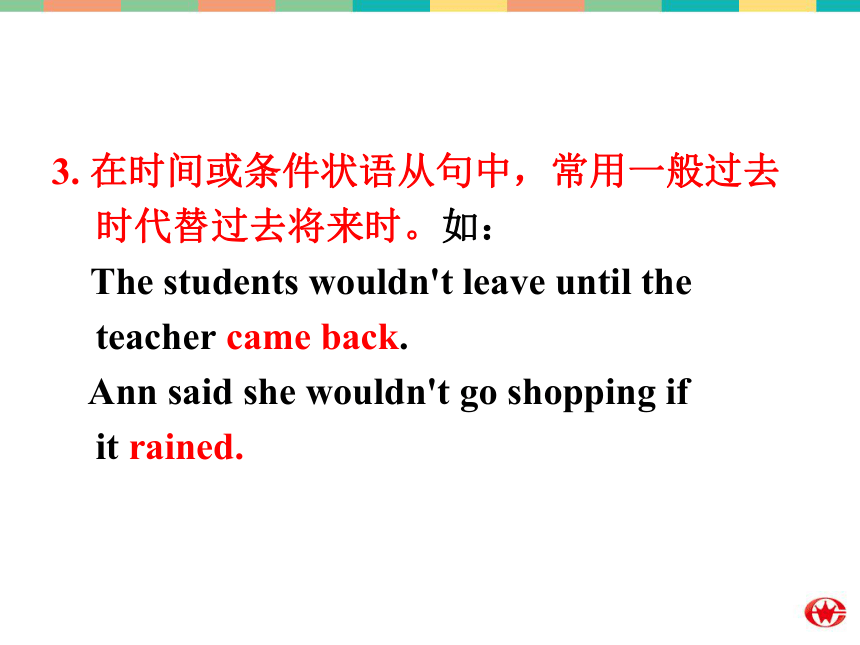

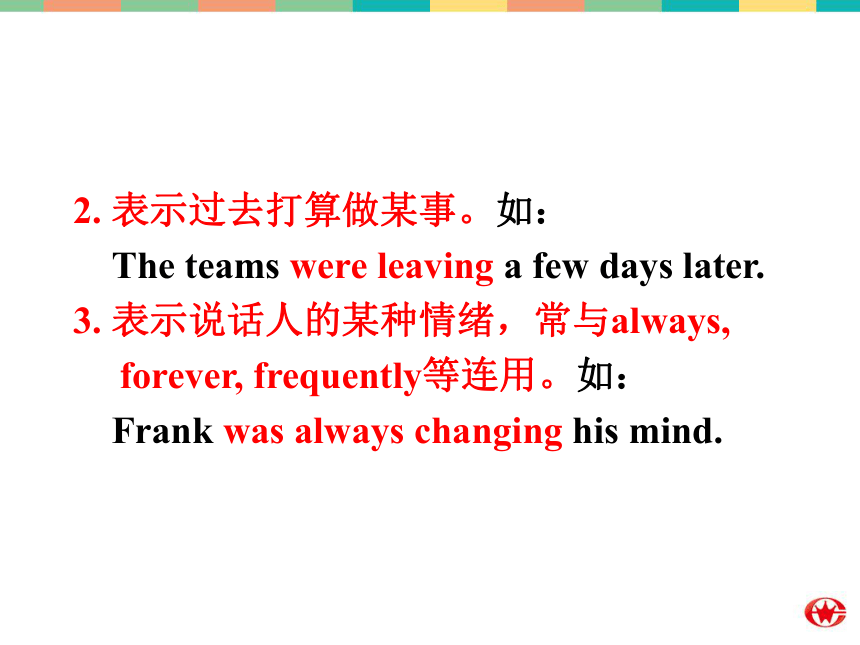
文档简介
(共41张PPT)
To review the use of the past simple tense, past continuous tense and past perfect tense.
Match the sentences with the names of the tenses.
past simple
past perfect
past continuous
He survived.
He was driving a lorry.
He had had lots of jobs.
Read the sentences and discuss the questions.
a. Which tense refers to actions in the past
b. Which tense refers to an action in progress when another thing happened
c. Which tense refers to something which happened before something else
1. Before he volunteered to direct traffic, Timoteo had had lots of jobs.
2. He was driving a lorry when he came off the road.
3. Somehow he survived.
c
b
a
1. 表示在过去时间里发生的动作或存在的状态,常与表示一般过去的时间状语连用。如:
He lived here three years ago.
2. 表示在过去一段时间内, 经常性或习惯性的动作。如:
He gave Mary surprising gifts every Christmas.
3. 在时间或条件状语从句中,常用一般过去时代替过去将来时。如:
The students wouldn't leave until the teacher came back.
Ann said she wouldn't go shopping if it rained.
构成形式为: was/were +动词-ing形式
1. 表示过去某一时刻或某一阶段正在进
行的动作。如:
I was trying to fix a machine before
you arrived.
They were building a dam last winter.
2. 表示过去打算做某事。如:
The teams were leaving a few days later.
3. 表示说话人的某种情绪,常与always, forever, frequently等连用。如:
Frank was always changing his mind.
构成形式为: had +动词-ed形式
1. 表示过去某一时间或动作之前已经发生或完成的动作。如:
I had finished writing the article when they came.
2. 表示在过去某一时间之前已经开始并一直持续到那时的动作或状态。如:
By six o'clock they had worked for twelve hours.
3. 表示过去本打算做某事却未能实现的希望和意图,只适用think, hope, expect, want, intend, plan, mean等表示意愿的动词。如:
They had wanted to help but couldn't get here in time.
Complete the passage with the correct form of the verbs.
I will never forget my first day at work. It was the end of July. I (1) _________ (do) my final school exams two weeks before, and I (2) __________ (wait) to go to university. I (3) _________ (see) an advertisement for a temporary job as a waiter in a smart restaurant. The manager (4) _________ (ask)
had done
was waiting
had seen
had asked
me to start on Saturday.
I needed to cool some bottles of white wine quickly, so I put them in the freezer. Back in the kitchen the assistant cook (5) __________ (cry). “What’s the matter ” I asked. “It’s the cook,” she said. “He (6) ________ (leave) five minutes ago. And there are fifty dinners still to cook.”
I (7) ________ (run) into the restaurant to tell the manager. He (8) __________ (talk) to
was crying
left
ran
was talking
customers. “Very good,” he said, when I (9) ___________ (finish) telling him. He (10) _____ (do) all the meals himself, and I don’t think anyone in the restaurant (11) _______ (know) what (12) ____________ (happen). But I (13) ___________ (forget) completely about the bottles in the freezer. When I (14) _______ (take) them out, they (15) _________ (freeze). I learnt a lot about work that day.
had finished
did
knew
had happened
had forgotten
took
had frozen
1) Susan had quit her well-paid job and _____________ (work) as a volunteer in the neighborhood when I visited her last year. (2018 北京)
2) A rescue worker risked his life saving two tourists who _______________ (trap) in the mountains for two days. (2018 北京)
was working
had been trapped
单句语法填空。
3) —_________ (do) you call that company to see how they think of our product yesterday
—Yes. They are happy with it. (2017 北京)
4) I __________ (drive) down to London when I suddenly found that I was on the wrong road. (2017 天津)
Did
was driving
5) Silk ___________ (become) one of the primary goods traded along the Silk Road by about 100 BC. (2016 浙江)
6) When walking down the street, I came across David, whom I ___________ (see) for years. (2016 天津)
had become
hadn’t seen
选用括号内合适的内容填空。
1. I was pleased to see my friends at the conference last week as we __________ (didn't see / hadn't seen) each other since graduation.
2. By the time we reached the stadium, the match __________ (had ended / ended) and the audience were leaving.
3. At the end of the meal, he found he couldn't pay his share of the bill because he ________ (hasn't brought / hadn't brought) his wallet with him.
hadn't seen
had ended
hadn't brought
4. We were pleased that Gary ________ (was having / had) his laptop with him, but we were less pleased when we discovered that the battery was dead.
5. When I came out of the cinema, I ________ (found / had found) that a thief had taken my phone from my bag.
6. At first the authorities thought the athlete had been using drugs, but they soon realized the lab ___________ (had mixed up / mixed up) the test results.
had
found
had mixed up
Complete the sentences with the correct
words and phrases.
1. “I visited China last year.” “That ________ interesting!”
A. Was B. can be
C. must be D. must have been
2. “I looked after a group of fifteen French children.” “That ______ easy!”
A. mustn’t be B. mustn’t have been
C. can’t have been D. wasn’t
3. They ___ have got lost, or had an accident.
A. can B. might C. must D. mustn’t
Which sentences show that the speaker is certain about something
1 and 2
Which sentences refers to a possibility in the past
3
情态动词must, can / could, may / might均可表示推测,它们可以对过去、现在或将来的情况作出语气强弱不同的推测。对过去的情况进行推测时,用“情态动词+ have +过去分词”。
1. 表示肯定的推测时,语气从弱到强的情态动词依次为:might → may → could
→ can → must;表示否定的推测时,may not / might not语气较弱,can’t / couldn’t语气较强。
注意:must的否定形式mustn’t不表示否定推测,而是表示“不得”或“一定不要”。
2. 情态动词表示推测时,在用法上有一些限制:
① must只用于肯定句中,意为“一定,准是”。
② can多用于否定句和疑问句中。
③ may / might用于肯定句和否定句中。
3. 对过去的情况进行推测时,用“情态动词+ have +过去分词”。如:
I didn’t see Alex. He might have gone home.
I couldn’t have left my bag on the bus.
They must have gotten lost or they’d be here by now.
【拓展】
在特定的语境中, “might / could + have +过去分词”不是对一件事情是否发生进行推测, 而是表示本来可能发生但没有发生, 或者本来可能完成却没有完成的动作, 有时具有一定的感彩。
① might have done本可以做(却没有), 有时表示很委婉的责备。如:
Honestly, the report might have been better written.
② could have done本可能做(却没有)。如:
He did not regret saying what he did but felt that he could have expressed it differently.
1. It’s strange that he ________ (should, might) have taken the books without the owner’s permission.
(江苏2018)
2. I can’t find my purse. I ____________ (could leave, could have left) it in the supermarket yesterday, but I’m not sure.
(天津2018)
should
could have left
1. “When I was younger, I worked as a miner.” “That _____ have been hard.”
2. I’m surprised David didn’t apply for the job. He _____ have seen the advertisement.
I. Complete the sentences with must,
can’t or might.
must
can’t
3. “Where’s Sam ” “I don’t know. He _______ have gone to the meeting.”
4. I don’t know why the manager didn’t reply. He ______ not have received our letter.
5. Jackie looks happy. They ______ have increased his salary.
6. The secretary wasn’t listening. She ______ have heard what I said.
might
might
must
can’t
II. Write sentences to say about each person using must, can’t or might.
1. Someone who has just returned from volunteer work in Africa
He might have learnt a kind of African language.
2. Someone who has just returned from a business trip to Europe
He must have met some important business people.
3. someone who was expected to arrive home from work an hour ago, but hasn’t arrived yet
He can’t have caught the train.
A: I visited China last year
B: That ______________ very interesting.
A: Not really. I still had to look after a group of French children who were visiting China.
B: That ______________ easy!
plete the dialogue with the correct
words and phrases.
must have been
can’t have been
A: No, it was a nightmare.
B: They ______ have got lost, or had an accident.
A: Yes, but luckily there were no disasters. I managed somehow.
might
1. Review Grammar and Function.
2. Finish the exercises on the
workbook.
To review the use of the past simple tense, past continuous tense and past perfect tense.
Match the sentences with the names of the tenses.
past simple
past perfect
past continuous
He survived.
He was driving a lorry.
He had had lots of jobs.
Read the sentences and discuss the questions.
a. Which tense refers to actions in the past
b. Which tense refers to an action in progress when another thing happened
c. Which tense refers to something which happened before something else
1. Before he volunteered to direct traffic, Timoteo had had lots of jobs.
2. He was driving a lorry when he came off the road.
3. Somehow he survived.
c
b
a
1. 表示在过去时间里发生的动作或存在的状态,常与表示一般过去的时间状语连用。如:
He lived here three years ago.
2. 表示在过去一段时间内, 经常性或习惯性的动作。如:
He gave Mary surprising gifts every Christmas.
3. 在时间或条件状语从句中,常用一般过去时代替过去将来时。如:
The students wouldn't leave until the teacher came back.
Ann said she wouldn't go shopping if it rained.
构成形式为: was/were +动词-ing形式
1. 表示过去某一时刻或某一阶段正在进
行的动作。如:
I was trying to fix a machine before
you arrived.
They were building a dam last winter.
2. 表示过去打算做某事。如:
The teams were leaving a few days later.
3. 表示说话人的某种情绪,常与always, forever, frequently等连用。如:
Frank was always changing his mind.
构成形式为: had +动词-ed形式
1. 表示过去某一时间或动作之前已经发生或完成的动作。如:
I had finished writing the article when they came.
2. 表示在过去某一时间之前已经开始并一直持续到那时的动作或状态。如:
By six o'clock they had worked for twelve hours.
3. 表示过去本打算做某事却未能实现的希望和意图,只适用think, hope, expect, want, intend, plan, mean等表示意愿的动词。如:
They had wanted to help but couldn't get here in time.
Complete the passage with the correct form of the verbs.
I will never forget my first day at work. It was the end of July. I (1) _________ (do) my final school exams two weeks before, and I (2) __________ (wait) to go to university. I (3) _________ (see) an advertisement for a temporary job as a waiter in a smart restaurant. The manager (4) _________ (ask)
had done
was waiting
had seen
had asked
me to start on Saturday.
I needed to cool some bottles of white wine quickly, so I put them in the freezer. Back in the kitchen the assistant cook (5) __________ (cry). “What’s the matter ” I asked. “It’s the cook,” she said. “He (6) ________ (leave) five minutes ago. And there are fifty dinners still to cook.”
I (7) ________ (run) into the restaurant to tell the manager. He (8) __________ (talk) to
was crying
left
ran
was talking
customers. “Very good,” he said, when I (9) ___________ (finish) telling him. He (10) _____ (do) all the meals himself, and I don’t think anyone in the restaurant (11) _______ (know) what (12) ____________ (happen). But I (13) ___________ (forget) completely about the bottles in the freezer. When I (14) _______ (take) them out, they (15) _________ (freeze). I learnt a lot about work that day.
had finished
did
knew
had happened
had forgotten
took
had frozen
1) Susan had quit her well-paid job and _____________ (work) as a volunteer in the neighborhood when I visited her last year. (2018 北京)
2) A rescue worker risked his life saving two tourists who _______________ (trap) in the mountains for two days. (2018 北京)
was working
had been trapped
单句语法填空。
3) —_________ (do) you call that company to see how they think of our product yesterday
—Yes. They are happy with it. (2017 北京)
4) I __________ (drive) down to London when I suddenly found that I was on the wrong road. (2017 天津)
Did
was driving
5) Silk ___________ (become) one of the primary goods traded along the Silk Road by about 100 BC. (2016 浙江)
6) When walking down the street, I came across David, whom I ___________ (see) for years. (2016 天津)
had become
hadn’t seen
选用括号内合适的内容填空。
1. I was pleased to see my friends at the conference last week as we __________ (didn't see / hadn't seen) each other since graduation.
2. By the time we reached the stadium, the match __________ (had ended / ended) and the audience were leaving.
3. At the end of the meal, he found he couldn't pay his share of the bill because he ________ (hasn't brought / hadn't brought) his wallet with him.
hadn't seen
had ended
hadn't brought
4. We were pleased that Gary ________ (was having / had) his laptop with him, but we were less pleased when we discovered that the battery was dead.
5. When I came out of the cinema, I ________ (found / had found) that a thief had taken my phone from my bag.
6. At first the authorities thought the athlete had been using drugs, but they soon realized the lab ___________ (had mixed up / mixed up) the test results.
had
found
had mixed up
Complete the sentences with the correct
words and phrases.
1. “I visited China last year.” “That ________ interesting!”
A. Was B. can be
C. must be D. must have been
2. “I looked after a group of fifteen French children.” “That ______ easy!”
A. mustn’t be B. mustn’t have been
C. can’t have been D. wasn’t
3. They ___ have got lost, or had an accident.
A. can B. might C. must D. mustn’t
Which sentences show that the speaker is certain about something
1 and 2
Which sentences refers to a possibility in the past
3
情态动词must, can / could, may / might均可表示推测,它们可以对过去、现在或将来的情况作出语气强弱不同的推测。对过去的情况进行推测时,用“情态动词+ have +过去分词”。
1. 表示肯定的推测时,语气从弱到强的情态动词依次为:might → may → could
→ can → must;表示否定的推测时,may not / might not语气较弱,can’t / couldn’t语气较强。
注意:must的否定形式mustn’t不表示否定推测,而是表示“不得”或“一定不要”。
2. 情态动词表示推测时,在用法上有一些限制:
① must只用于肯定句中,意为“一定,准是”。
② can多用于否定句和疑问句中。
③ may / might用于肯定句和否定句中。
3. 对过去的情况进行推测时,用“情态动词+ have +过去分词”。如:
I didn’t see Alex. He might have gone home.
I couldn’t have left my bag on the bus.
They must have gotten lost or they’d be here by now.
【拓展】
在特定的语境中, “might / could + have +过去分词”不是对一件事情是否发生进行推测, 而是表示本来可能发生但没有发生, 或者本来可能完成却没有完成的动作, 有时具有一定的感彩。
① might have done本可以做(却没有), 有时表示很委婉的责备。如:
Honestly, the report might have been better written.
② could have done本可能做(却没有)。如:
He did not regret saying what he did but felt that he could have expressed it differently.
1. It’s strange that he ________ (should, might) have taken the books without the owner’s permission.
(江苏2018)
2. I can’t find my purse. I ____________ (could leave, could have left) it in the supermarket yesterday, but I’m not sure.
(天津2018)
should
could have left
1. “When I was younger, I worked as a miner.” “That _____ have been hard.”
2. I’m surprised David didn’t apply for the job. He _____ have seen the advertisement.
I. Complete the sentences with must,
can’t or might.
must
can’t
3. “Where’s Sam ” “I don’t know. He _______ have gone to the meeting.”
4. I don’t know why the manager didn’t reply. He ______ not have received our letter.
5. Jackie looks happy. They ______ have increased his salary.
6. The secretary wasn’t listening. She ______ have heard what I said.
might
might
must
can’t
II. Write sentences to say about each person using must, can’t or might.
1. Someone who has just returned from volunteer work in Africa
He might have learnt a kind of African language.
2. Someone who has just returned from a business trip to Europe
He must have met some important business people.
3. someone who was expected to arrive home from work an hour ago, but hasn’t arrived yet
He can’t have caught the train.
A: I visited China last year
B: That ______________ very interesting.
A: Not really. I still had to look after a group of French children who were visiting China.
B: That ______________ easy!
plete the dialogue with the correct
words and phrases.
must have been
can’t have been
A: No, it was a nightmare.
B: They ______ have got lost, or had an accident.
A: Yes, but luckily there were no disasters. I managed somehow.
might
1. Review Grammar and Function.
2. Finish the exercises on the
workbook.
